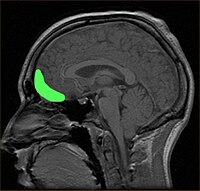
Photo from wikipedia
Endocannabinoids are lipid neuromodulators that are synthesized on demand and primarily signal in a retrograde manner to elicit depression of excitatory and inhibitory synapses. Despite the considerable interest in their… Click to show full abstract
Endocannabinoids are lipid neuromodulators that are synthesized on demand and primarily signal in a retrograde manner to elicit depression of excitatory and inhibitory synapses. Despite the considerable interest in their potential analgesic effects, there is evidence that endocannabinoids can have both pro-nociceptive and anti-nociceptive effects. The mechanisms contributing to the opposing effects of endocannabinoids in nociception need to be better understood before cannabinoid-based therapies can be effectively utilized to treat pain. Using the medicinal leech, Hirudo verbana, this work investigates whether endocannabinoids modulate tonic inhibition onto non-nociceptive afferents. In voltage clamp recordings, we analyzed changes in the tonic inhibition in pressure-sensitive (P) cells following pre-treatment with endocannabinoids, 2-arachidonoylglycerol (2-AG) or anandamide (AEA). We also tested whether high frequency stimulation (HFS) of nociceptive (N) cells could also modulate tonic inhibition. Both endocannabinoid application and N cell HFS depressed tonic inhibition in the P cell. Depression of tonic inhibition by N cell HFS was blocked by SB 366791 (a TRPV1 inhibitor). SB 366791 also prevented 2-AG-and AEA-induced depression of tonic inhibition. HFS-induced depression was not blocked by tetrahydrolipstatin (THL), which prevents 2-AG synthesis, nor AM 251 (a CB1 receptor inverse agonist). These results illustrate a novel activity-dependent modulation of tonic GABA currents that is mediated by endocannabinoid signaling and is likely to play an important role in sensitization of non-nociceptive afferent pathways.
Journal Title: Frontiers in Synaptic Neuroscience
Year Published: 2022
Link to full text (if available)
Share on Social Media: Sign Up to like & get
recommendations!